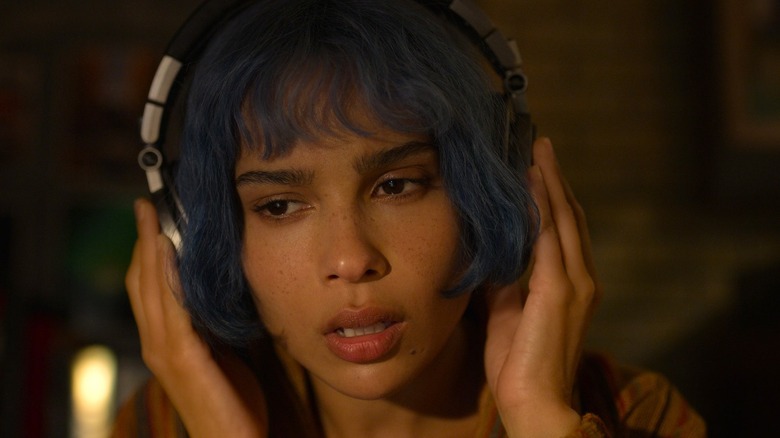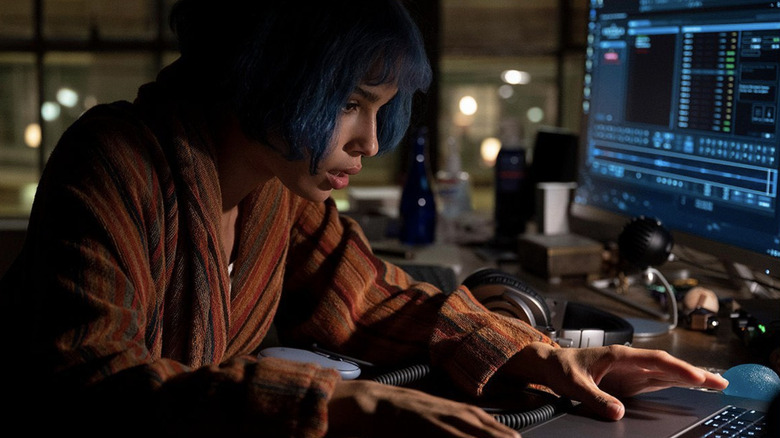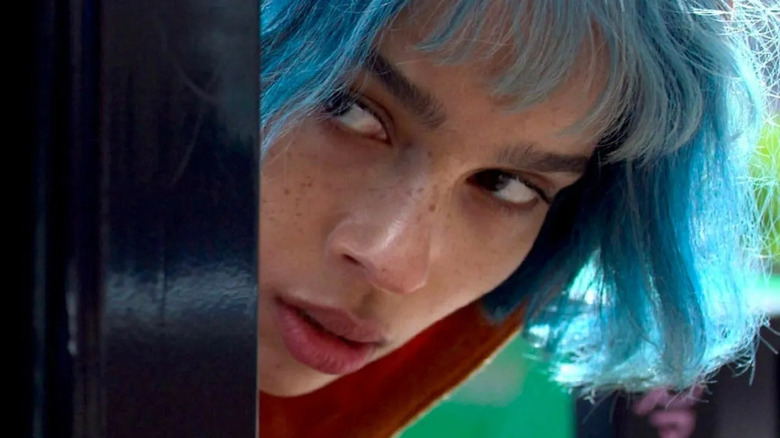Kimi Review: Alexa, Play A Movie Worth Watching
A taut Hitchcockian thriller for the COVID era, "Kimi" is an odd beast of a film. It's anchored by a riveting performance from Zoë Kravitz, and when she's the only person onscreen (which is about 90 percent of the time), you'll find yourself on the edge of your seat and unable to look away. But oddly enough, after channeling some of the greatest directors of all time and unleashing several masterful sequences, director Steven Soderbergh allows the film to slide into straight-to-video territory at the end, letting down his leading lady — and the viewer.
Written by industry vet David Koepp ("Jurassic Park," "Carlito's Way," 2002's "Spider-Man"), the movie is focused squarely on Angela Childs (Kravitz), a blue-haired, quirky, frequently abrasive young woman who lives alone in a tech-heavy apartment. Every day, she fights with her upstairs neighbor doing construction, looks into the apartments of people across the street, makes video calls to those in her life (mother, therapist, dentist) and battles the extreme, trauma-induced agoraphobia that has rendered her a prisoner in her own home. Angela also does her job: listening and logging brief audio clips from the "Kimi" devices (think Alexa, Siri, etc.) of unknown people.
With her own trusty Kimi just a few feet away, ready to light up and spring into action whenever she calls its name, Angela goes about her work. Most of the clips she gets are innocuous enough — users asking the device to play a song or make a phone call — but one day she discovers a file with loud, aggressive techno music blasting. Deep down within the background noise, she believes she can hear a woman being violently attacked.
As conventions of the genre dictate, no one believes her. Angela digs deeper and deeper, against everyone's wishes and our own suspicions that such actions might be driven by her own past as the survivor of a violent attack, and she finds more. This woman on the file was murdered, and now she's the only one who can stop the man behind it.
Google "Master of Suspense," and the name that comes up is Alfred Hitchcock, undoubtedly one of the greatest and most influential filmmakers to ever live. The man defined multiple genres (action thriller, slasher film) still in play today, and there is little doubt that if he were somehow alive and young and at the height of his talents in 2022, "Kimi" is the sort of movie he'd be making. Hitchcock classics like "Rear Window," "The Man Who Knew Too Much," and "Vertigo" are all over this film.
It should also be mentioned that one of the greatest filmmakers of a later generation, Brian De Palma, is an unapologetic Hitchcockian devotee, and one of his best films, 1981's "Blow Out," feels like it might have been the primary influence here. Then there's 1974's "The Conversation," one of the best films made by De Palma's friend and contemporary Francis Ford Coppola, which is also an undeniable ingredient in this sinister, sound-driven cinematic smoothie.
These are films about protagonists with one sense (sight, hearing) that has overcome all others — and quite possibly their common sense. Travolta in "Blow Out," Hackman in "The Conversation," Stewart in "Rear Window," now Kravitz in "Kiki" — all succumb to a deep, disturbing paranoia, walking the fine line between obsession and "doing the right thing." All become obsessed with the lives (and/or deaths) of people they barely know, risking alienation of those in their own lives, to uncover some truth as they re-examine the evidence again and again looking for clues in audio files or through their binoculars. Each of their films also operate as a commentary on the world at that time, as fears of encroaching invasions of privacy clash against natural human concern for one's neighbors.
An audiophile with an audio file
But enough about its influences. "Kimi" has enough originality and grit to forge its own path, thanks largely to its talented leading lady and director Steven Soderbergh, who is clearly having a lot of fun building tension around things like a bottle of kombucha, making the viewer inevitably lean closer and closer to their screen as Angela listens to the audio clip for the umpteenth time, all of us wondering if she really just heard what we thought she heard.
It should be mentioned that "Kimi" is one of the first films to address (albeit tangentially) the COVID-19 reality in which we all find ourselves. While most current movies were filmed at some point after early 2020, they are content to depict people without face masks, scenes with crowds, and otherwise go about business as usual — likely in the belief that audiences want to escape right now, not be reminded. "Kimi" takes a different approach, as Angela admits the pandemic is one of the reasons she is afraid to leave her home; Soderbergh masterfully uses the ritual of putting on a face mask to go outside as a suffocating act one must endure.
Eventually, and extremely reluctantly, Angela does leave her home. Soderbergh uses every trick he's got to convey the overwhelming, unmoored sensation the character feels as she navigates the outdoors, and he does a terrific job. This is where the one-room thriller becomes a worldwide conspiracy, with bad-acting strangers and black vans around seemingly every corner. She's determined to venture to her company's headquarters and present her evidence, but the people behind the crime are increasingly aware of her activities — and use every bit of tech they can to track her down and stop the truth from getting out.
This is where Soderbergh employs modern technology paranoia to great effect. Our cell phones allow the bad guys to track us, sure, but how do they have our retinal scan? When we agreed to their voluminous terms and conditions, what did we really give them permission to collect? And what about "Kimi," the voice-activated assistant hub in our homes? What is she listening to, how much is she recording, and is she an obtrusive spy, or a possible savior in a moment of desperation?
Social distancing
Unfortunately, this is also around the time that Soderbergh drops the ball. Filmmaking is such a group effort, with everyone so dependent on everyone else doing their job perfectly, that it's hard to believe any movie ever works. But, likely long after Kravitz finished her masterful job on set, Soderbergh (admittedly and undoubtedly, one of the greatest filmmakers of his generation) seems to have made a series of poor post-production choices that takes a hard left from riveting thriller to Redbox-rental-co-starring-Bruce-Willis territory.
The ominous murderers, up until now shadowy, intimidating figures, suddenly become the stumbling, fuming Wet Bandits from "Home Alone." The cutaway scenes, with bad actors handing each other envelopes containing crypto currency payoffs and lamenting "Crazy times, the world these days. It bums me out, to be honest," are clunky and poorly cast. The big showdown is punctuated with a perky, upbeat score that sounds like it belongs in a children's fantasy film, not under footage of a man pointing a gun in someone's face. Through clunky editorial choices and unlikely action choreography, these men who once seemed so foreboding become "America's Dumbest Criminals" rejects taken down by the Beastie Boys. They don't even have enough common sense to unplug the Kimi of someone that they need to murder because they forgot to unplug the Kimi of the last person they murdered.
Which is a shame, because "Kimi" is so effective for the overwhelming majority of its running time. And to be fair, De Palma's early '80s Hitchcockian masterpieces ("Body Double," "Dressed to Kill") also had a tendency to slather themselves in enough B-movie trappings to nearly overwhelm the audience's ability to take them seriously. So in a way, even the disappointing conclusion of "Kimi" feels like a throwback.


